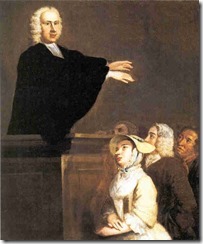 I’m in an interesting discussion in a book group, in which we’re reading Jemar Tisby’s book “The Color of Compromise” (https://amzn.to/2UrMEOm).
I’m in an interesting discussion in a book group, in which we’re reading Jemar Tisby’s book “The Color of Compromise” (https://amzn.to/2UrMEOm).
We’re looking at two men who tower above others in the early Colonial days: Jonathan Edwards and George Whitefield.
These men are well-known in Evangelical circles. They preached a redeeming Gospel, they brought many into contact with God, and they helped define American Protestantism as a faith of the individual.
And yet both supported slavery. George Whitefield so much that he helped convince the state of George to convert from being a slave-free state to becoming a white-slaver state—he needed the money from his enslaved Africans in order to make money to support his orphanage. (Yes, indeed.)
And Jonathan Edwards, from a young age (24), owned people, even before he began his lengthy career as an evangelist and while he was an evangelist. He preached the Gospel while content with his own white-slavery lifestyle.
Now, there are some who would defend these men, either by minimizing slavery, or by excusing their sin because they were so influential for God.
Here’s my response:
God uses clay to make pots to pour out his glory. Edwards was a sinner as are all men. God will use the worst of men and women to rescue his people in order that His glory is upheld.
Edwards was a slave-owner, and the Gospel did not cleanse his mind and soul enough to acknowledge what other men and women realized contemporaneously, that owning people as slaves was biblically wrong and sinful. He was washed in his white-supremacist culture. He exemplifies how easy it is to be caught up on our context and not see how much we still hold onto that is deeply offensive but we are willfully blind not to see it.
As a white American man myself, I can look back at Edwards, and see things about him that I think are, out of context, admirable.
But imagine being someone like Martin Luther King, Jr., in his seminary at Crozer in 1950, reading Edwards and hearing the encomiums by other white men, and then looking at himself in his own body to say “but I would not be included in Edwards kingdom as a full and equal citizen. I might be a brother to Edwards, but I could never be a brother-in-law.”
We have to stop trying to whitewash our past. Edwards was used by the Sovereign Lord, but Edwards beliefs and actions of sinful racism are not sanctified by his being used by God.
We should also, in my opinion, use Edwards as a warning for our own selves, that perhaps the things we think are inconsequential are actually of grave importance. We may see the Lord this minute. We may be waiting for a thousand years more. Should he tarry, our children and children’s children will see our slothfulness to self-inquiry and wonder why we were so easily accommodating sin while demanding it cease in others..
Edwards and Whitefield are just as likely to end up in heaven as I am. Were I to also make it (by the grace of God) I would find a discussion between them and someone like Dr. King or Rev. Barbour to be of great personal interest. “You professed to bring people into the Kingdom while you were content with owning the likes of me.”
Now that would be awesome.

